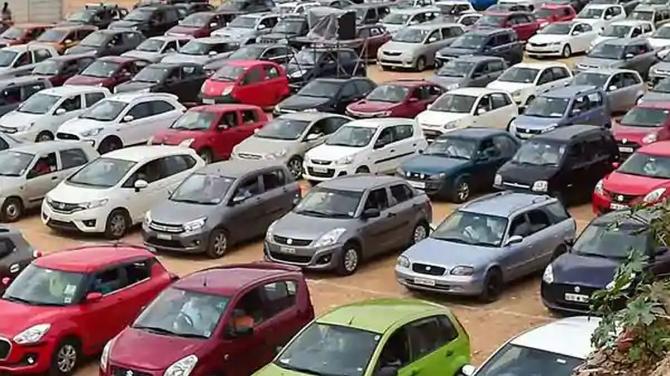The economy segment of India’s car market is unlikely to revive soon term as inflation and prices prompt buyers to defer purchases.

The share of entry-level cars in the passenger vehicle market dropped to the lowest in seven years at the end of the Financial Year 2021-22 (FY22).
A recovery in the segment will be largely driven by the overall economic growth, improvement in income levels, and easing of semiconductor shortage, say carmakers and analysts.
“There is a dramatic drop in the affordability factor for the hatches.
"A slew of regulations on safety and emissions coupled with the inflationary trends, have bumped up prices,” said Shashank Srivastava, executive director at Maruti Suzuki India.
The weighted average on-road price of an entry level model jacked up by 42 per cent to Rs 557,332 at the end of FY22 from Rs 339,221 in FY17, as per industry estimates.
The spike has made such models out of reach for those who would typically graduate from a two-wheeler to a four wheeler.
It has impacted the entry-level cars the most as their prices have increased 29 per cent more compared to 11 per cent for premium hatches, he said.
Price sensitivity among buyers, too, has made the segment vulnerable.
The numbers tell the tale: the share of entry level small cars such as Alto Wagon R, Santro, i10 among other models, as a percentage to overall sales, dropped to the lowest in seven years to 17.9 per cent at the end of FY22 from 27.3 percent in FY15.
Even in absolute volume terms, the decline is steep: to 550,578 units from 709832 units in the same period.
As the sale of entry-level models slows down, the contribution of first-time buyers in the overall market has remained constant at 46-47 per cent, said Srivastava.
That’s largely because many of the first-timers are straight away buying premium hatches or compact SUVs, he explains.
The shift to premium models, such as a compact SUV, among first-time buyers and slow business for entry-level cars has prompted manufacturers to make changes.
The number of model offerings in the economy segment of the car market has dropped to seven at the end of April 2022 from a dozen in FY15.
Hyundai Motor India that phased out the Santro earlier this month is the latest among the carmakers to de-prioritise the entry-level market.
“A relatively higher sensitivity among the small car buyers to sharp price hikes makes it tough for manufacturers to pass on the cost increases.
"As a result, manufacturers are prioritising pricier models--which also fetch better margins, over the mass ones," said Mitul Shah, head of research, at Reliance Securities.
“Incessant price increases have impacted volumes and economy of scale dented margins and profitability on small cars further,” added Shah.
This has skewed volumes in favour of premium models.
The contribution of utility vehicles in the passenger vehicle market jumped to 48.5 per cent in FY22 from 27.9 per cent in FY19.
Similarly, the contribution of premium compact cars also jumped to 20.5 per cent from 16.6 per cent in the same period, according to Society of Indian Automobile Manufacturers (Siam).
According to Aniket Mhatre and Sonaal Sharma, analysts at HDFC Securities, the so-called “premiumisation trend” is partly the result of a growing income divide in the Indian consumer class over the last few years.
"Given the rising income disparity in India after the pandemic, we believe that the mid-low-income consumer is deferring his next vehicle purchase, raising the average replacement cycle.
"On the other hand, the upper-income class, which has been the least impacted, has persisted with its purchase plans,” they wrote in a recent research report.
The trend has led to a higher-than-natural skew toward higher-end vehicles, giving rise to a “partially false” notion of a sharp premiumisation trend at play in recent years.
Even as the premiumisation trend is likely to increase across all consumer classes in the coming years, the extent of the shift in the mix is not entirely a function of premiumisation, but also a function of rising income disparities following the pandemic.
“Thus, as the economy gradually recovers, we expect the mid-low income class of consumers to return to the market.
"This could partially reverse the above segmental trends in future years,” they wrote.
Even as the going has got tough for small cars, Maruti’s Srivastava is optimistic that once the economic situation and the availability of semiconductors, the demand for small cars will bounce back.











